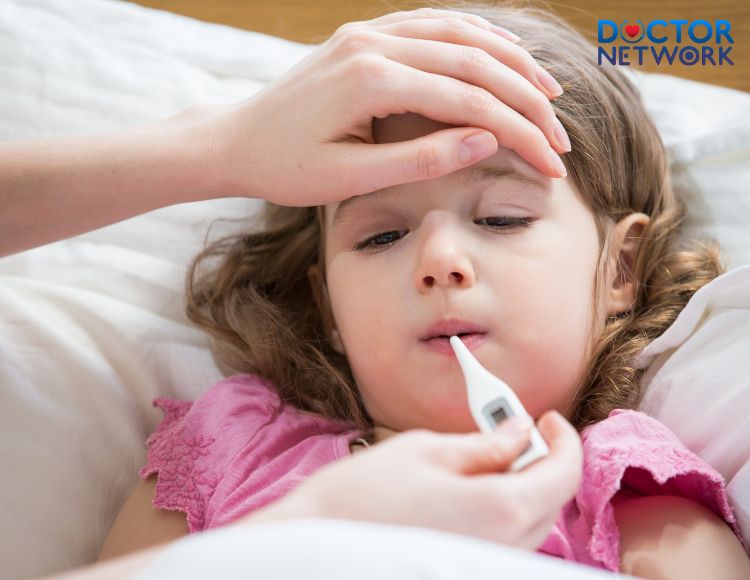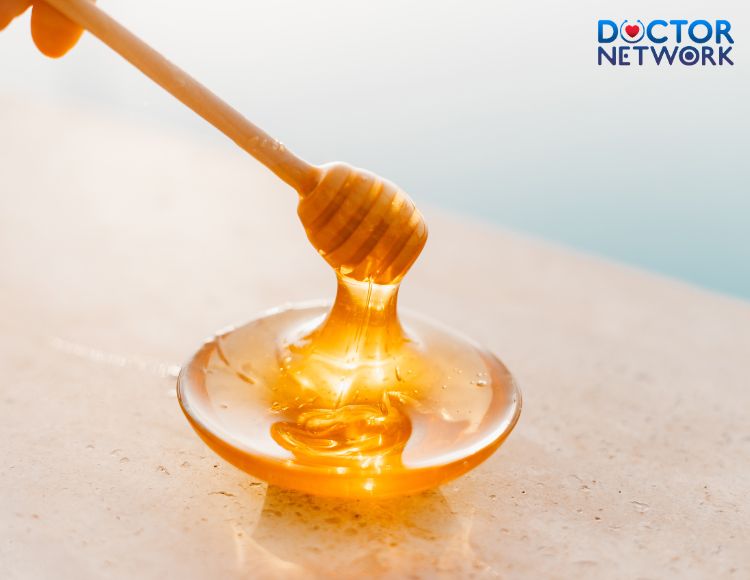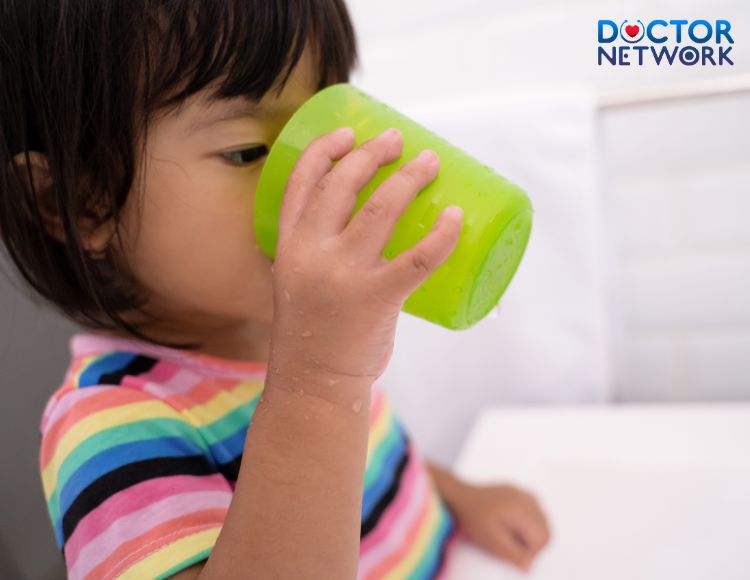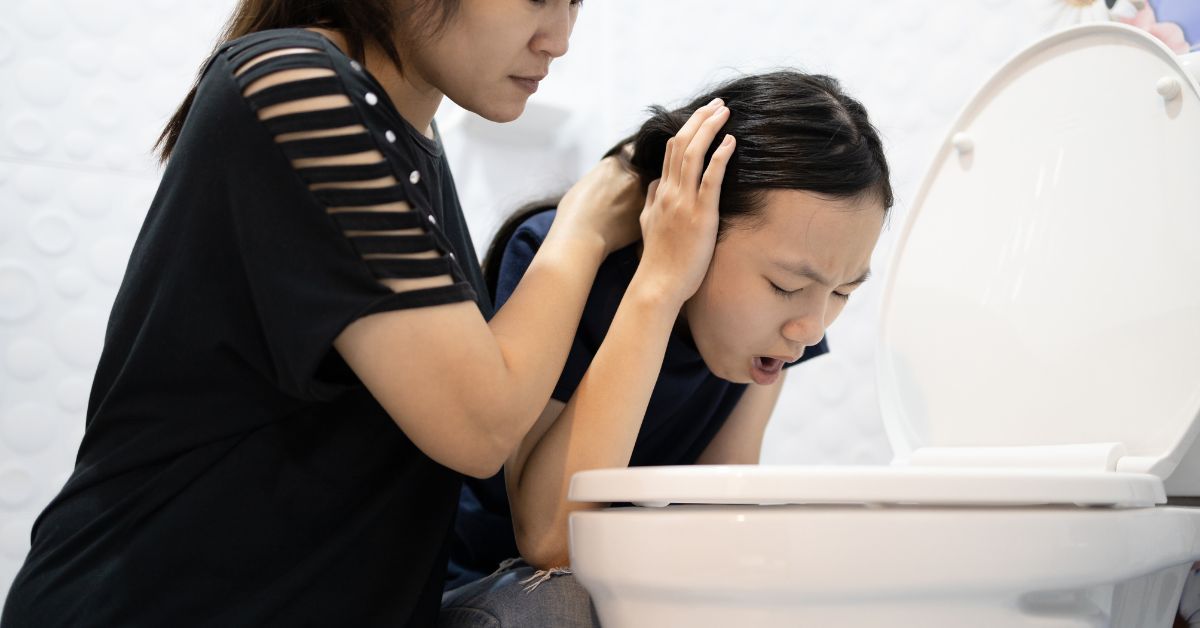Middle ear infection is an infection located behind the eardrum, common in young children, causing pain, fever, irritability, and potentially affecting hearing if not promptly treated. This article aims to help parents understand how to care for and Home Remedies for Middle Ear Infections in Children, as well as recognize signs that require immediate medical attention.
Symptoms of Middle Ear Infection in Children
- Fever: Children with middle ear infections may have mild to high fevers above 38°C.

Children with otitis media may have a mild fever or a high fever above 38 degrees Celsius
- Earache: Severe ear pain often causes the child to cry and be very irritable.
- Irritability, difficulty sleeping: The child may be uncomfortable, restless, tug at their ear, have difficulty sleeping, or sleep poorly.
- Hearing impairment: The child may have difficulty hearing or respond slowly when called.
- Ear discharge: The eardrum may rupture, causing fluid to leak from the ear.
- Other symptoms: Vomiting, diarrhea, loss of appetite…
Home Remedies for Middle Ear Infections in Children
It’s important to note that home remedies for middle ear infections in children are only supportive measures to alleviate pain and discomfort and should not replace medical treatment entirely.
Warm compress: Use a warm cloth on the affected ear for 15-20 minutes to reduce swelling and pain.
Cold compress: A cold compress can be applied around the infected ear to help reduce swelling.
Physiological saline solution: Use nasal saline drops or spray to clean the nasal passages, facilitate ear drainage, and keep airways clear.
Honey: For children over 1 year old, honey may help soothe throat pain associated with middle ear infections. However, never give honey to infants under 1 year old due to the risk of botulism.

You can use a cold compress around the inflamed ear area to help reduce swelling
Watercress – home remedy for middle ear infection in children: Some traditional remedies use watercress to assist in treating middle ear infections; however, the effectiveness of this method has not been fully scientifically validated.
When to Take Your Child to the Doctor Immediately?
Parents should take their child to the doctor immediately if any of the following signs appear:
- High fever above 38°C that does not respond to fever-reducing medications.
- Severe ear pain causing the child to cry excessively and not sleep.
- Ear discharge or pus drainage.
- Symptoms of middle ear infection do not improve after 2-3 days of home care.
- The child has a history of ear problems or has a weakened immune system.
Prevention of Middle Ear Infections in Children
- Hygiene: Maintain good hygiene of the throat and nasal passages with nasal saline solution.

Maintain good hygiene of the throat and nasal passages with nasal saline solution
- Breastfeeding: Exclusive breastfeeding for the first 6 months of life enhances the immune system, helping children fight off various illnesses, including middle ear infections.
- Avoid secondhand smoke: Exposure to cigarette smoke increases the risk of middle ear infections in children.
- Vaccination: Ensure children receive all recommended vaccinations, especially pneumococcal and influenza vaccines.
Common Questions about “Home Remedies for Middle Ear Infections in Children”
Here are 5 common questions related to “home remedies for middle ear infections in children”:
Can I use olive oil to treat my child’s middle ear infection?
Answer: Although some people use warm olive oil to alleviate ear pain from middle ear infections, there is insufficient scientific evidence to prove olive oil’s effectiveness in treating middle ear infections. Consult a doctor before applying any folk remedy, including using olive oil, for your child.
Does my child with middle ear infection need to take antibiotics?
Answer: Not all cases of middle ear infections require antibiotics. The doctor will assess the child’s condition, severity, and medical history to determine whether antibiotics are necessary. Self-administration of antibiotics for a child can do more harm than good.
My child frequently suffers from recurring middle ear infections. How can I prevent them?
Answer: Here are some ways to prevent middle ear infections in children:
- Exclusive breastfeeding for the first 6 months of life.
- Avoid exposing the child to cigarette smoke.
- Maintain throat hygiene with nasal saline solution.
- Ensure the child receives all vaccinations according to schedule, especially pneumococcal and influenza vaccines.
- Avoid allowing the child to breastfeed lying down.
Is using garlic to treat middle ear infections safe for my child?
Answer: Garlic may have some antibacterial properties, but there is insufficient evidence to show that garlic helps treat middle ear infections. Introducing any substance into the ear (including garlic) without a doctor’s recommendation can cause additional irritation and worsen the condition, especially in young children.
Can I take my child swimming while they have a middle ear infection?
Answer: Children with middle ear infections should not swim until the infection is completely healed. Dirty water can enter the ear and worsen the condition. It is best to consult a doctor to determine when the child can safely return to swimming.
Scientific Evidence on “Home Remedies for Middle Ear Infections in Children”
Here are some scientific references on home remedies for middle ear infections in children commonly used:
- A 2018 study published in the journal “Pediatrics” suggests that applying warm compresses to the affected ear for 15-20 minutes each time may help alleviate ear pain in children with middle ear infections.
- A 2015 study published in the journal “Pain” suggests that applying cold compresses to the affected ear for 20 minutes each time may also help alleviate ear pain in children with middle ear infections.
- The American Academy of Pediatrics (AAP) recommends using nasal saline solution drops or spray to rinse the nasal passages and promote fluid drainage in children with middle ear infections. A 2012 study published in the “Cochrane Database of Systematic Reviews” suggests that nasal saline irrigation may improve symptoms and reduce the need for antibiotics in children with acute middle ear infections.
- A review in 2017 of studies published in the journal “Clinical Pediatrics” suggests that honey may be effective as a cough suppressant in reducing cough in children with upper respiratory tract infections, a condition often associated with middle ear infections. However, it is important to note that honey should not be given to children under 1 year old due to the risk of botulism.
- Evidence is limited regarding the scientific evidence supporting the use of watercress to treat middle ear infections. Although some traditional medical practices recommend using watercress, more rigorous studies are needed to determine its effectiveness and safety.
Middle ear infections are common in children but can be managed effectively. Parents can practice some home remedies to help alleviate discomfort for their children at home. However, seeking medical advice for antibiotic prescriptions (if necessary) and appropriate treatment methods is crucial to ensure children recover quickly and prevent serious complications.
References:
https://www.healthdirect.gov.au/otitis-media
https://www.ncbi.nlm.nih.gov/pmc/articles/PMC4758427/
https://www.aafp.org/pubs/afp/issues/2013/1001/p435.html
Kiểm Duyệt Nội Dung
More than 10 years of marketing communications experience in the medical and health field.
Successfully deployed marketing communication activities, content development and social networking channels for hospital partners, clinics, doctors and medical professionals across the country.
More than 6 years of experience in organizing and producing leading prestigious medical programs in Vietnam, in collaboration with Ho Chi Minh City Television (HTV). Typical programs include Nhật Ký Blouse Trắng, Bác Sĩ Nói Gì, Alo Bác Sĩ Nghe, Nhật Ký Hạnh Phúc, Vui Khỏe Cùng Con, Bác Sỹ Mẹ, v.v.
Comprehensive cooperation with hundreds of hospitals and clinics, thousands of doctors and medical experts to join hands in building a medical content and service platform on the Doctor Network application.

























